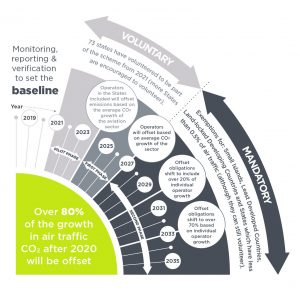The 27th June 2018 marked a major milestone in the implementation of CORSIA, the aviation global carbon offsetting scheme, with the ICAO Council adopting rules for the monitoring, reporting and verification of the scheme.
CORSIA, the Carbon Offsetting and Reduction Scheme for International Aviation, is the first global sectoral emissions reduction system. It is the scheme that will enable aviation to achieve its longstanding goal of carbon neutral growth from 2020.
Annually, airlines will be required to calculate the emissions from their flights and buy carbon offsets equivalent to any increase over a baseline of 2019-2020 average.
The recent agreement established the ground rules for compliance with the landmark scheme. It is a significant achievement particularly given the global scale of the negotiations and collaboration that have taken place, and the fact that it’s less than two years since the ICAO assembly which originally agreed to implement CORSIA.
The scheme is being introduced in phases; voluntary (for countries rather than for airlines) from 2021 to 2026 then compulsory beyond that for most countries with a significant aviation market.
Airlines are now preparing their emissions monitoring plans and will begin measuring their baseline emissions from 1st January next year. Every airline in the world with international routes and CO2 emissions over 10,000 tonnes per year is required to participate.
So far, 73 states including the UK, EU and United States have volunteered to be part of the scheme from 2021.Over 80% of the growth in air traffic CO2 after 2020 will be offset.

Sustainable Aviation and our members, working with IATA, the UK Government, the EU and NGOs is encouraging other countries to sign up too. The wider the participation in the scheme, the sooner aviation can mitigate its climate effects and establish a robust carbon market to ensure the success of the scheme for the future.
Next steps will see details on emission unit eligibility and sustainability criteria for sustainable aviation fuels agreed. These aspects are important to give the carbon market time to ensure a supply of environmentally-robust emissions units, and also to enable airlines to prepare to purchase emissions units.
We’re also reiterating our position with the EU and UK that a global mechanism is the best way to deal with aviation emissions and should be the only measure applicable to carbon emissions from flights within the European Economic Area from 2021. This is vital to avoid placing a double regulatory burden on European airlines and putting them at competitive disadvantage in the global market.
CORSIA puts aviation on track to first capping and then reducing its net carbon emissions. Under the scheme airlines will invest in 2.6 billion tonnes worth of CO2 reductions between 2021 and 2035, making it critical to the development of an effective global carbon market that will have wide-reaching positive impacts well beyond aviation.
CORSIA’s strength is that it directly addresses aviation’s climate emissions and delivers a pathway not only to meeting the aviation industry’s target of 50% net reduction in CO2 by 2050 versus 2005, but potentially also offers the basis for a pathway towards net zero emissions for aviation – an exciting prospect!
Carrie Harris, Group Sustainability Manager, International Airlines Group
